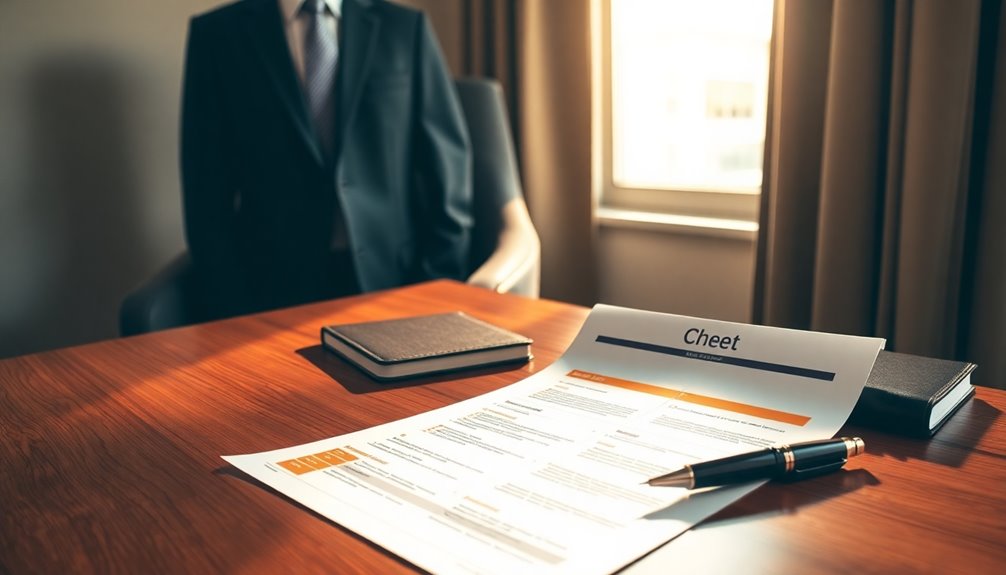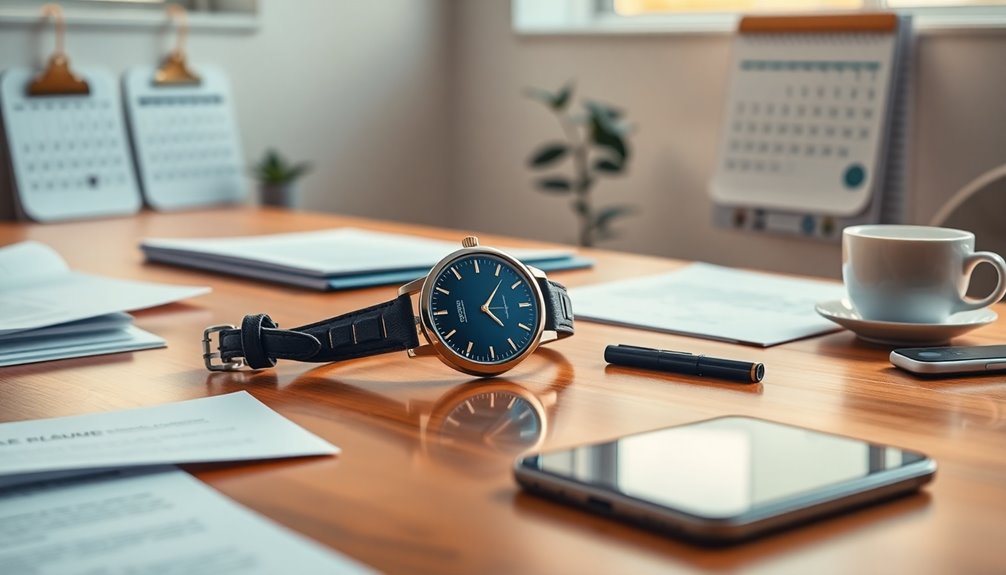To walk into your interview like a boss, start by creating a cheat sheet that highlights the job description and your aligned skills. Research the company culture and craft a 60-second personal statement using the SEAT structure: Skills, Experience, Achievements, and Type of role. Prepare five success stories with the STAR method for behavioral questions and come equipped with insightful questions for your interviewer. On the day, arrive early, dress professionally, and maintain good eye contact. Remember, your confidence starts with preparedness, and there's more to master that can set you apart in the room.
Key Takeaways
- Create an interview cheat sheet that aligns your skills with the job description to boost confidence during the interview.
- Develop a 60-second personal statement using the SEAT structure, highlighting your relevant experiences and achievements.
- Practice your success stories using the STAR method to effectively communicate your qualifications and problem-solving abilities.
- Prepare insightful questions for the interviewer to demonstrate your interest in the company and role, enhancing your engagement.
- Dress professionally, arrive early, and maintain positive body language to convey confidence and professionalism throughout the interview.
Pre-Interview Preparation Tips

Preparation is key to acing your interview. Start by creating an interview cheat sheet that includes the job description and highlights your skills aligned with the role. Research the company, its industry, and competitors. This knowledge showcases your interest and helps you respond confidently to common interview questions.
Next, craft a concise 60-second personal statement that summarizes your experiences and skills, making it clear why you're a strong fit for the position. Use the STAR method to develop five success stories that you can draw upon for behavioral questions. These stories should clearly outline the Situation, Task, Action, and Result, illustrating your problem-solving abilities and achievements.
Don't forget to prepare insightful questions for the interviewer. These should reflect your research and genuine curiosity about the role and company culture, making a lasting impression. Finally, organize a professional portfolio that includes extra copies of your resume, the job description, and your company research. This will help you present yourself as a well-prepared and serious candidate. With these pre-interview preparation tips, you'll walk into your interview like a boss!
Crafting Your Personal Statement

When it comes to making a strong impression in an interview, your personal statement is essential. You've got around 60 seconds to convey your background and intentions, so make certain it's concise. Use the "SEAT" structure: showcase your Skills, Experience, Achievements, and the Type of role you're pursuing. Tailor your statement to reflect the company's values and the specific job posting, demonstrating how you align with their mission.
Consider including a brief anecdote or highlight a key achievement to make your statement memorable and engaging for the hiring manager. This personal touch can set you apart from other candidates. Furthermore, ensuring that you are in a calm and focused state can enhance your performance; techniques such as nighttime meditation can improve your mental clarity and reduce anxiety before the big day.
Practice delivering your personal statement aloud. This guarantees you present it confidently and naturally during your interview. The more you rehearse, the more comfortable you'll feel, and that confidence will translate to your delivery.
Essential Interview Day Checklist

On interview day, having a solid checklist can make all the difference in your performance. To help you nail that job interview and secure your new job, here's a concise checklist to follow:
- Arrive Early: Get to the interview location at least 10 minutes early. This illustrates your punctuality and professionalism.
- Bring Resumes: Print multiple copies of your resume on quality paper. Verify each interviewer has one to review.
- Notepad and Pen: Carry a notepad and pen to take notes during the interview. This shows you're engaged and genuinely interested in the conversation.
- Dress Professionally: Choose attire that aligns with the company culture. Before entering, check your appearance in the mirror to confirm you look polished.
Professional Conduct Upon Arrival

Arriving at the interview location is just the beginning; it's vital to guarantee you're mentally and physically prepared before stepping into the interview room. Take a moment to review your prepared stories and answers to verify you're sharp and ready. Even though you may feel nervous, this quick mental check can boost your confidence.
Before meeting the interviewer, pop into the restroom to check your appearance. A polished and professional look can make a significant difference in first impressions. After that, introduce yourself to the receptionist with a courteous demeanor; this sets a positive tone for your visit and reflects well on you.
When it's time to greet the interviewer, remember to offer a firm handshake paired with a warm smile. This simple gesture conveys confidence and friendliness, essential qualities in any candidate. Throughout your interaction, maintain steady eye contact with the interviewer. This illustrates engagement and assertiveness, making you stand out as a strong contender. Additionally, being aware of healthy boundaries can help you navigate the professional environment with respect and confidence.
Effective Communication During the Interview

Effective communication during your interview can set you apart from other candidates. Focus on your body language, practice active listening, and articulate your thoughts clearly for the best impact. By mastering these skills, you'll create a positive impression and foster a constructive dialogue with your interviewer.
Body Language Importance
Body language plays an essential role in how you're perceived during an interview, often influencing the outcome more than you might realize. Positive body language can boost your confidence and engagement by as much as 80%. Here are four key aspects to focus on:
- Eye Contact: Maintain consistent eye contact to convey confidence and interest. It shows you're engaged and attentive.
- Firm Handshake: A strong handshake creates a positive first impression. This simple gesture can greatly impact how the interviewer views you right from the start.
- Open Gestures: Use open hand movements to express enthusiasm and professionalism. Closed-off gestures can signal discomfort or defensiveness.
- Mirroring: Subtly mimic the interviewer's body language. This technique builds rapport and helps create a connection, making the interaction feel more comfortable.
Additionally, consider adopting a power pose before entering the interview room. This can boost your self-confidence and reduce anxiety, leading to a better performance. Remember, nonverbal cues account for about 55% of communication, so mastering your body language is vital for success! Cultivating emotional intelligence in your interactions can further enhance your ability to connect with the interviewer.
Active Listening Techniques
How can you truly stand out in an interview? One powerful way is through active listening. This means fully concentrating on the interviewer, understanding their message, and responding thoughtfully. To demonstrate engagement, use techniques like nodding, maintaining eye contact, and offering verbal affirmations such as "I see" or "That's interesting." These actions not only show you're attentive but also encourage the interviewer to elaborate on their points.
Before you respond, try paraphrasing or summarizing what the interviewer said. This confirms your understanding and signals that you value their input. For example, saying, "So, you're saying that the team's success relies heavily on collaboration?" can clarify any confusion and create a positive dialogue.
Don't forget to ask insightful follow-up questions based on their comments. This reinforces your active listening skills and highlights your genuine interest in the role and the company. Remember, practicing active listening can greatly enhance your communication effectiveness. Studies show that effective listeners are often perceived as more competent and trustworthy. By honing these skills, you'll leave a lasting impression and walk into your interview like a boss! Additionally, embracing a growth mindset can further empower you to view challenges as opportunities for learning and improvement during the interview process.
Clear Articulation Strategies
Active listening is only one part of the communication puzzle in an interview. To truly shine, you need to articulate your thoughts clearly and concisely. Here are some strategies to enhance your communication:
- Use Clear Language: Avoid jargon and complex terms. Speak plainly to guarantee your message is easily understood.
- Maintain Eye Contact: This fosters trust and shows confidence. It also makes your responses more impactful, letting the interviewer know you're engaged.
- Follow the SEAT Structure: Organize your answers using Skills, Experience, Achievement, and Type. This framework helps you present your professional narrative effectively.
- Practice Aloud: Rehearsing your responses will enhance your articulation. It'll make you more comfortable and fluid during the real conversation.
- Cultivate a Growth Mindset: Embracing a growth mindset allows you to approach challenges with confidence, making you more adaptable and appealing to potential employers.
Post-Interview Reflection Strategies

After an interview wraps up, taking a moment to reflect can greatly enhance your future performance. Immediately jot down your thoughts and feelings about the experience while it's still fresh in your mind. This practice helps you capture your initial impressions, which can be essential for your growth.
Later, review your notes to identify your strengths and areas for improvement. This reflection can help refine your approach for future interviews. Don't forget to send a thank-you letter within 24 hours; it highlights your professionalism and reiterates your qualifications for the position.
Additionally, follow up on any next steps discussed during the interview. This shows your continued interest in both the role and the company, setting you apart from other candidates. Keeping track of any feedback you received during the process is also significant. This feedback can be invaluable for your growth and development in future applications.
Common Interview Mistakes to Avoid

When you address the wrong interviewer, you risk embarrassing yourself and damaging your chances for success. It's also essential to share personal stories that highlight your experiences; they can make your responses more relatable and memorable. Avoid these common pitfalls to enhance your interview performance and leave a lasting impression.
Addressing Wrong Interviewer
Addressing the wrong interviewer can instantly create discomfort and undermine your chances of making a positive impression. To avoid this common mistake, here are some effective strategies you can implement:
- Research: Before your interview, look up the names and titles of your interviewers. This shows you're detail-oriented and professional.
- Confirm: During the scheduling process, always verify the names and roles of your interviewers. This simple step can save you from an awkward situation.
- Take Notes: Keep a list of who you'll be meeting with, and refer to it during the interview. This helps guarantee you address each person correctly.
- Practice Introductions: Rehearse how you'll introduce yourself and use the interviewers' names. This not only builds rapport but also demonstrates your appreciation for their role in the process.
If you neglect these steps, you risk signaling a lack of preparation, which could raise doubts about your interest in the role and the company. By paying attention to whom you're addressing, you'll walk into your interview with confidence and poise.
Neglecting Personal Stories
Your interview success often hinges on the stories you share. Personal anecdotes can transform your responses from vague to impactful, showcasing your skills and experiences in a relatable way. When you neglect to include these stories, you risk losing the interviewer's attention and leaving a weaker impression.
Here's a quick breakdown of why personal stories matter:
| Reason | Impact | Tip |
|---|---|---|
| Provides concrete examples | Makes you memorable | Prepare 2-3 relevant stories |
| Builds rapport and trust | Shows authenticity | Use personal connections |
| Highlights problem-solving skills | Demonstrates qualifications | Align stories with job needs |
Incorporating your personal stories can help you establish clear goals that reflect your journey and aspirations.
Structuring Your Responses

Structuring your responses effectively can set you apart in an interview. A clear and organized answer not only showcases your skills but also keeps the interviewer engaged. Here are some frameworks to help you craft compelling responses:
- SEAT: When introducing yourself, cover your Skills, Experience, Achievement, and Type. This gives a well-rounded picture of who you are.
- SNOW: For discussing weaknesses, use Saying no and Overworked to frame your growth and self-awareness positively. This shows you're proactive about your development.
- JOB: When asked why you want the job, refer to the Job description, Opportunity, and Build. This aligns your career goals with the company's vision, demonstrating your commitment.
- ARM: Highlight your strengths using Attention to detail, Resilience, and Meticulous examples. This resonates with what the interviewer's looking for.
Resources for Interview Success

A variety of resources can greatly enhance your interview success. First, consider using cheat sheets for quick reference. These can help you structure your responses to common questions, making you feel more prepared. Additionally, access to 100 brilliant answers to difficult interview questions can boost your confidence and readiness for those tricky scenarios.
Regular practice is key. Rehearse your prepared stories and structured responses to improve your recall and delivery during the actual interview. The more familiar you become with your material, the more naturally you'll respond under pressure.
Don't overlook motivational content, either. Engaging with inspiring articles or videos can equip you with the mindset needed for success. Subscribing to career development resources keeps you informed and motivated, making your preparation more effective. Embracing the power of imagination can also help you visualize success and enhance your overall confidence.
Finally, networking on platforms like LinkedIn can provide invaluable insights. Collaborating with peers allows you to share experiences and gain support, enhancing your overall preparedness. By utilizing these resources, you'll walk into your interview feeling like a boss, ready to tackle any challenge that comes your way.
Building a Supportive Network

Building a supportive network can greatly boost your job search and career advancement. Studies reveal that a strong professional network increases your chances of job referrals by up to 70%. Personal connections often lead to hidden opportunities, so it's crucial to invest time in building those relationships.
Here are four effective strategies to enhance your network:
- Engage on LinkedIn: Connect with industry professionals to enhance your visibility and credibility, making you more appealing to potential employers.
- Attend Networking Events: Participate in industry conferences and community workshops. These events offer invaluable skill development and can lead to mentorship opportunities that support your growth.
- Join Professional Organizations: Get involved with associations related to your field. They can connect you with peers and provide access to job postings and industry insights.
- Follow Up: After meeting new contacts, send a quick message to express your appreciation. This helps solidify the relationship and keeps you on their radar for future opportunities.
Additionally, cultivating your network can enhance your leadership skills and create a foundation for long-term career success.
Frequently Asked Questions
How to Prepare a Cheat Sheet for an Interview?
To prepare a cheat sheet for your interview, start by listing your interviewers' names to personalize your approach. Next, jot down prompts for success stories that highlight your skills. Include insightful questions to ask at the end, showing your genuine interest. Create a notes section for capturing key points during the interview. Finally, organize everything with clear headings to keep it concise and easy to navigate, ensuring you feel confident and prepared.
Is It OK to Bring a Cheat Sheet to an Interview?
Yes, it's generally okay to bring a cheat sheet to an interview, as long as you use it discreetly. It can help you stay organized and focused on key points about the company and your responses. Just make sure you practice with it beforehand so you can engage naturally. Remember, the goal is to connect with the interviewer, so don't rely on it too heavily. Stay confident and let your personality shine through!
What Is the Best Way to Memorize Interview Answers?
Imagine you're a wizard casting spells of confidence in an interview. To memorize your answers, start by using the "SEAT" structure for clarity. Practice aloud to reinforce your memory, and don't forget to create mnemonic devices for key points. Record yourself to catch areas needing improvement, and rehearse with a friend who can give feedback. By doing this, you'll transform your interview nerves into magical moments of assurance.
What Is the Rule of 3 in Interviewing?
The Rule of 3 in interviewing suggests you prepare three key points or stories that showcase your skills, experiences, and achievements. This technique helps you present your qualifications in a structured and memorable way. By focusing on three main ideas, you enhance clarity and stay organized during your responses. Make sure these points align with the job requirements and the company's values, demonstrating your suitability for the position effectively.
Conclusion
Now that you're armed with this cheat sheet, you're ready to strut into your interview like a rockstar! Remember, preparation is key—nail your personal statement, double-check your checklist, and keep your cool. Avoid common pitfalls and structure your responses confidently. With the right mindset and support, you're not just going to ace the interview; you'll leave them wondering how they ever interviewed without you! Go get that job and shine like the superstar you are!
Felicity, our Author, pens in-depth articles and guides that delve into the heart of personal discovery. Her narrative-driven approach weaves together theory, practice, and personal anecdotes, making the journey of self-exploration both relatable and inspiring. Felicity’s contributions help illuminate the path for those seeking a deeper understanding of themselves and their relationships.










